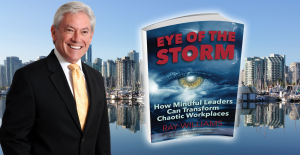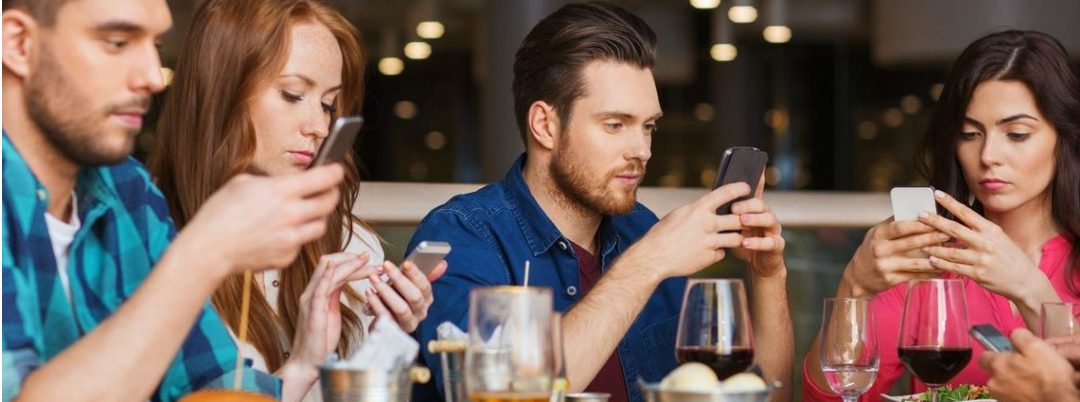This article is a 10 minute read.
It’s been there for a while, gnawing at the back of your mind: the creeping suspicion that technological devices have reached the point of diminishing returns when it comes to productivity. Oh sure, being able to edit documents on a phone or create presentations on a computer the size of a dinner plate has been amazing and made us much more efficient than we were. But these devices work so well, we’re having trouble turning them off, and that’s hurting our productivity and well being.
Social media has been the important part of one’s life from shopping to electronic mails, education and business tools. Social media plays a vital role in transforming people’s life style. Since the emergence of these social networking sites can be key tools for news, journalists and their organizations. These sites have become a day-to-day routine for people. Social media has been mainly defined to refer to “the many relatively inexpensive and widely accessible electronic tools that facilitate anyone to publish and access information, collaborate on a common effort, or build relationship.” During the past 10 years, the rapid development of social networking sites (SNSs) such as Facebook, Twitter, YouTube and Instagram, and so on has caused several profound changes in the way people communicate and interact. Facebook, as the biggest social networking website, today has more than one billion active users, and it is estimated that in the future, this number will significantly increase, especially in developing countries. Facebook is used for both business and personal communication, and its application has brought numerous advantages in terms of increasing connectivity, sharing ideas, and online learning.
Three billion people, around 40% of the world’s population, use online social media – and we’re spending an average of two hours every day sharing, liking, tweeting and updating on these platforms, according to some reports. That breaks down to around half a million tweets and Snapchat photos shared every minute.
With social media playing such a big part in our lives, could we be sacrificing our mental health and well-being as well as our time? What does the evidence actually suggest?
The Positive News
Researchers at Cornell University in New York put 63 students into different groups. Some sat with a mirror placed against a computer screen, for instance, while others sat in front of their own Facebook profile. Facebook had a positive effect on self-esteem compared to other activities that boost self-awareness. Mirrors and photos, the researchers explained, make us compare ourselves to social standards, whereas looking at our own Facebook profiles might boost self-esteem because it is easier to control how we’re presented to the world.
Other research has found, that for some people, social media can help boost their well-being. Marketing researchers Jonah Berger and Eva Buechel found that people who are emotionally unstable are more likely to post about their emotions, which can help them receive support and bounce back after negative experiences.
So is social media good or bad for us? In a new study published in the Journal of Mental Health, PhD student Elizabeth Seabrook, Dr Nikki Rickard from Monash University found that it is not as clear-cut as you might think. They reviewed 70 studies that have examined how social network use relates to depression, anxiety, and subjective wellbeing. Results were mixed. Some studies found social media users were happier and more connected with other people.
But other studies found that social media users had more signs of depression or anxiety. So we also looked at various factors that had an impact on when it is beneficial or harmful.
Studies were conducted between 2005 and 2016, mostly with adolescents and young adults. Most focused on Facebook, with a few studies centered around the use of Twitter, and Facebook, or social media in general. These studies examined a variety of themes, including how much time people spent on social media, the number of friends they had, and whether or not they liked and felt accepted by their friends. Also examined were the words they used, how much personal information they shared, whether they compared themselves with others, and how much they felt addicted to social media. Across the studies, it appears that it’s not so much that social media causes anxiety and depression, but that people have different ways of using social media, which may be more or less helpful.
Jacob Amedia of Santa Clara University examined the impact of social media on society. He described the following positive influences:
- Social media is a new forum that brings people to exchange ideas, connect with, relate to, and mobilize for a cause, seek advice, and offer guidance. Social media has removed communication barriers and created decentralized communication channel and open the door for all to have a voice and participate in a democratic fashion including people in repressive countries.
- Convergence technology, social networking sites and the applications which link the two together can also enhance freedom and mobility. They offer the ability to access information and communicate with others at any time and in any place regardless of the physical location of other people.
- By communicating online, it allows people to see past physical differences and focus on a deeper connection, discovering similarities that may have been previously disregarded.
- By forming groups of people with similar interests (particularly if the interest or hobby is not mainstream), social networking sites can create a sense of unity and belonging in people who might have previously felt alienated in society because of an inability to relate to local people.
- Social networking sites also offer the chance of communication in cases where mobility is often a hindrance to social interaction. Elderly people and those with physical disabilities who have an inability to leave their house are able to stay in touch with existing relations and friends, as well as get in touch with people who have similar issues. The use of social networking sites amongst deaf teens is an example of the benefits of online communication in relationship to physical disabilities.
- Another benefit to communicating through social networking sites is the promotion of education and news. People can share information via links, reviews and applications. They may source this information from other places and share them with others or provide their own information for education, updates of news or support.
- Businesses are also honing in on the ability to market and advertise through social networking sites. “New media shifts the balance of control for production and distribution of content between corporations and consumers” (Young, 2006) and social networking sites form part of this balance. Through online social networking, companies are better able to advertise to specific markets or discover, monitor and engage with loyal brand advocates.

The Bad News
Here’s some of the research which has identified the negative aspects of social media:
- In 2014, researchers in Austria found that participants reported lower moods after using Facebook for 20 minutes compared to those who just browsed the internet. The study suggested that people felt that way because they saw it as a waste of time.
- Researchers have looked at general anxiety provoked by social media, characterised by feelings of restlessness and worry, and trouble sleeping and concentrating. A study published in the journal Computers and Human Behaviour found that people who report using seven or more social media platforms were more than three times as likely as people using 0-2 platforms to have high levels of general anxiety symptoms.
- Two studies involving more than 700 students found that depressive symptoms, such as low mood and feelings of worthlessness and hopelessness, were linked to the quality of online interactions. Researchers found higher levels of depressive symptoms among those who reported having more negative interactions.
- A similar study conducted in 2016 involving 1,700 people found a threefold risk of depression and anxiety among people who used the most social media platforms. Reasons for this, they suggested, include cyber-bullying, having a distorted view of other people’s lives, and feeling like time spent on social media is a waste.
- Humans used to spend their evenings in darkness, but now we’re surrounded by artificial lighting all day and night. Research has found that this can inhibit the body’s production of the hormone melatonin, which facilitates sleep – and blue light, which is emitted by smartphone and laptop screens, is said to be the worst culprit. In other words, if you lie on the pillow at night checking Facebook and Twitter, you’re headed for restless slumber.Last year, researchers from the University of Pittsburgh asked 1,700 18- to 30-year-olds about their social media and sleeping habits. They found a link with sleep disturbances – and concluded blue light had a part to play. How often they logged on, rather than time spent on social media sites, was a higher predictor of disturbed sleep, suggesting “an obsessive ‘checking’”, the researchers said.
- In 2011, Daria Kuss and Mark Griffiths from Nottingham Trent University in the UK have analyzed 43 previous studies on the matter, and conclude that social media addiction is a mental health problem that “may” require professional treatment. They found that excessive usage was linked to relationship problems, worse academic achievement and less participation in offline communities, and found that those who could be more vulnerable to a social media addiction include those dependent on alcohol, the highly extroverted, and those who use social media to compensate for fewer ties in real life.
- Women’s magazines and their use of underweight and Photoshopped models have been long maligned for stirring self-esteem issues among young women. But now, social media, with its filters and lighting and clever angles, is taking over as a primary concern among some campaigning groups and charities. Social media sites make more than half of users feel inadequate, according to a survey of 1,500 people by disability charity Scope, and half of 18- to 34-year-olds say it makes them feel unattractive.
- A 2016 study by researchers at Penn State University suggested that viewing other people’s selfies lowered self-esteem, because users compare themselves to photos of people looking their happiest. Research from the University of Strathclyde, Ohio University and University of Iowa also found that women compare themselves negatively to selfies of other women.

- A study of 1,000 Swedish Facebook users found that women who spent more time on Facebook reported feeling less happy and confident. The researchers concluded: “When Facebook users compare their own lives with others’ seemingly more successful careers and happy relationships, they may feel that their own lives are less successful in comparison.”
- In a study from 2013, researchers texted 79 participants five times a day for 14 days, asking them how they felt and how much they’d used Facebook since the last text. The more time people spent on the site, the worse they felt later on, and the more their life satisfaction declined over time. A paper written last year by researchers from the Netherlands suggested social media has a more negative effect on the well-being of those who are more socially isolated.
- Romantic relationships aren’t immune, either. Researchers at the University of Guelph in Canada surveyed 300 people aged 17-24 in 2009 about any jealousy they felt when on Facebook, asking questions such as, ‘How likely are you to become jealous after your partner has added an unknown member of the opposite sex?’.Women spent much more time on Facebook then men, and experienced significantly more jealousy when doing so. The researchers concluded they “felt the Facebook environment created these feelings and enhanced concerns about the quality of their relationship”.
- In a study involving 600 adults, roughly a third said social media made them feel negative emotions – mainly frustration – and envy was the main cause. This was triggered by comparing their lives to others’, and the biggest culprit was other people’s travel photos. Feeling envious caused an “envy spiral”, where people react to envy by adding to their profiles more of the same sort of content that made them jealous in the first place.
- A study published in the American Journal of Preventive Medicine last year surveyed 7,000 19- to 32-year-olds and found that those who spend the most time on social media were twice as likely to report experiencing social isolation, which can include a lack of a sense of social belonging, engagement with others and fulfilling relationships.
- The American Academy of Pediatrics has warned about the potential for negative effects of social media in young kids and teens, including cyber-bullying and “Facebook depression.” But the same risks may be true for adults, across generations. Here’s a quick run-down of the studies that have shown that social media isn’t very good for mental well-being, and in some ways, it can be pretty damaging.
- One study a few years ago found that Facebook use was linked to both less moment-to-moment happiness and less life satisfaction—the more people used Facebook in a day, the more these two variables dropped off. The authors suggest this may have to do with the fact that Facebook conjures up a perception of social isolation, in a way that other solitary activities don’t.
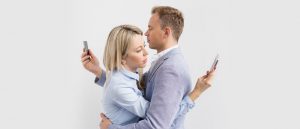
- And studies have confirmed that people tend to undergo a kind of withdrawal: A study a few years ago from Swansea University found that people experienced the psychological symptoms of withdrawal when they stopped using (this went for all internet use, not just social media). Their recent follow-up study found that when people stop using, they also undergo small but measurable physiological effects.
- A review study from Nottingham Trent University looked back over earlier research on the psychological characteristics, personality and social media use. The authors conclude that “it may be plausible to speak specifically of ‘Facebook Addiction Disorder’…because addiction criteria, such as neglect of personal life, mental preoccupation, escapism, mood modifying experiences, tolerance and concealing the addictive behavior, appear to be present in some people who use [social networks] excessively.”
- Another studyfound that social media use is linked to greater feelings of social isolation. The team looked at how much people used 11 social media sites, including Facebook, Twitter, Google+, YouTube, LinkedIn, Instagram, Pinterest, Tumblr, Vine, Snapchat and Reddit, and correlated this with their “perceived social isolation.” Not surprisingly, it turned out that the more time people spent on these sites, the more socially isolated they perceived themselves to be. And perceived social isolation is one of the worst things for us, mentally and physically.
- One study looked at how we make comparisons to others posts, in “upward” or “downward” directions—that is, feeling that we’re either better or worse off than our friends. It turned out that both types of comparisons made people feel worse, which is surprising, since in real life, only upward comparisons (feeling another person has it better than you) makes people feel bad. But in the social network world, it seems that any kind of comparison is linked to depressive symptoms.
- Studies have certainly shown that social media use triggers feelings of jealousy. The authors of one study, looking at jealousy and other negative feelings while using Facebook, wrote that “This magnitude of envy incidents taking place on FB alone is astounding, providing evidence that FB offers a breeding ground for invidious feelings.
- A couple of years ago, a study found that more friends on social media doesn’t necessarily mean you have a better social life—there seems to be a cap on the number of friends a person’s brain can handle, and it takes actual social interaction (not virtual) to keep up these friendships.
- And studies have found that taking a break from Facebook helps boost psychological well-being. If you’re feeling brave, try taking a little break, and see how it goes. And if you’re going to keep “using,” then at least try to use in moderation.
- A recent study in a high school student population, we found a statistically significant positive correlation between depressive symptoms and time spent on SNS.
- A report by Mehdizadeh described the findings of a study in which 100 Facebook users at York University provided self-esteem and narcissistic personality self-reports. The results indicated that individuals with lower self-esteem are more active online in terms of having more self-promotional content on their SNS profiles. In other words, certain Facebook activities (such as “The Main Photo” feature) were negatively correlated with self-esteem measured with the Rosenberg Self-Esteem Scale.
- You probably didn’t realize that reading on e-readers actually takes longer than it does with print. That was the finding of tech expert Jakob Nielsen in 2010. Specifically, Nielsen found readers go 6.2% slower on iPads and 10.7% slower on Kindles. More recent studies have shown more repetition necessary to retain information that is consumed via screen than paper, which is another way of saying reading takes longer and hampers productivity.
- Multitasking may be the biggest myth perpetrated on American workers since the latest US jobs report. Using technology to do two (or more) things at once is supposed to make things go twice as fast. Sorry, pal; turns out it makes each task take 25% longeron average. Splitting our attention between email and a phone call, say, simply leads to more mistakes that require more time to fix than they saved, not to mention the time needed to refocus on what you were doing before you switched tasks. The human brain is simply not wired for multitasking, period.
Smartphone Addiction
More and more people’s lists of good intentions for the coming year include a pledge to shut off the phone and live more in the moment.
There have been multiple studies suggesting that over-involvement with our digital devices can create or exacerbate problems:
- One study found that young people who are heavy technology users have a higher risk of sleep disturbances and mental health issues.
- Other research found that the so-called “Google effect.” The advent of the Internet, with sophisticated algorithmic search engines, has made accessing information as easy as lifting a finger. No longer do we have to make costly efforts to find the things we want. We can “Google” the old classmate, find articles online, or look up the actor who was on the tip of our tongue. The results of four studies suggest that when faced with difficult questions, people are primed to think about computers and that when people expect to have future access to information, they have lower rates of recall of the information itself and enhanced recall instead for where to access it. The Internet has become a primary form of external or “transactive” memory, where information is stored collectively outside ourselves.
- Still another study showed that the mere presenceof a cell phone is distracting enough to impede performance on mental tasks.
- And other studies have shown that browsing light-emitting devices like iPads and e-readers at bedtime disrupts sleep.
- 84% of cell phone users claim they could not go a single day without their device.
- 67% of cell phone owners check their phone for messages, alerts, or calls — even when they don’t notice their phone ringing or vibrating.
- Studies indicate some mobile device owners check their devices every 6.5 minutes.
- 88% of U.S. consumers use mobile devices as a second screen even while watching television.
- Almost half of cell owners have slept with their phone next to their bed because they wanted to make sure they didn’t miss any calls.
- Some researchers have begun labeling “cell phone checking” as the new yawn because of its contagious nature.
- But we don’t need statistics to tell us we are over-attached to our technology. We already know this to be true—which is probably why this powerful video (link) has received over 13,000,000 views in less than six days.
- Information overload. Fifty-four thousand words: that’s how much textual information—in the form of digital content—is dumped on the average social media user per day. When that measure is expanded to include emails, digital imagery, web browsing, and the like, it increases dramatically. According to a 2011 study reported by the Telegraph, we receive about 200 newspapers-worth of information everyday. And how much information does the average person produce? About six newspapers-worth. Whether you’re sending messages via text or Tinder, it all adds up. That same study also found that there were 295 exabytes of data floating around the world—that’s 29,500,000,000,000,000,000,000 pieces of information. Three-hundred and fifteen times the number of grains of sand on Earth. That was in 2011; we’ve no doubt surpassed that count by now.
- Scientifically speaking, the Fear of Missing Out (FOMO) has been recognized as a recently emerging psychological disorder brought on by the advance of technology. The premise is simple. Our social media streams are ever-filled with everything happening all around us. Nowadays, we even see the plates of food our friends are enjoying. And within this constant stream of notification, our fear of being left out continues to grow. Turning off social media and finding contentment in our present space is a welcome skill.
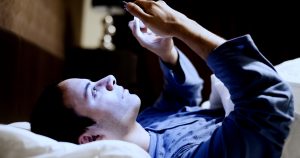
Max Blumberg, a research psychologist from the University of London, said in a recent interview, “Our brains haven’t evolved to handle that level of high activity yet,” he continued– “And that’s a problem.”The science of how always-on technology impacts human behavior hasn’t been extensively explored—maybe because we’re still in the dawning of the information age. But some studies have been done, and the results are distressing. Researchers have found that social media might promote narcissism, smartphones could be causing insomnia, and screens seem to be making our kids less empathetic.“Our brains will always be seduced by the high stimuli [of constant connectivity] because of the dopamine that it provides,” Blumberg explained in another interview. “It’s really similar to having ADHD.”
“People with ADHD, their big problem is that their cortex—the outer part of your brain that does the executive function like making decisions—doesn’t function in the way that it is supposed to,” he continued. “Unlike animals, who are distracted by every stimulus they encounter, human beings have the cortex, which is supposed to help them weigh up whether what they are currently doing is more important than whatever the new stimulus is—whether it’s a Facebook notification, phone call, or email.”
Essentially, we’re over-stimulating ourselves he says. Constant connectivity makes it hard to sustain attention on one task at a time. It can make us get all willy-nilly with our focus, giving our attention to whatever is right in front of us, without thinking about whether or not what is in front of us is truly worth our time. As a result, it’s harder to engage in deep thought, critical thought, and creativity.
Blumberg thinks this is going to have a serious impact on society: “In fact, what I think we’re going to see is a society that is even more divided into the ‘haves’ and the ‘have-nots’. And we’re already starting to see that the kids from richer backgrounds are really restricted in the amount of TV and internet that they are allowed to use because their parents who built these big companies know what is required to be able to achieve such things, so those kids are going to end up building the big companies of the future.
“And the kids from poorer backgrounds, who are online all the time and have a very reactive brain, will end up being the consumers and customers of the other kids’ companies. There will be a huge market where people will buy anything because the brand is flashed up without having any critical thinking about it because their brains are not used to deep thinking.”
What to Do About It: Some Suggestions
There’s a whole variety of pro-active steps we can take to counteract the negative effects of social media and tendency toward addiction. Here’s a few:
- Choose to start your day elsewhere.Henry Ward Beecher once said, “The first hour is the rudder of the day.” Spend it wisely. Commit to not turning on technology during your first waking hour. After all, the world ran just fine without you for the previous 7-8 hours, one more won’t hurt. Blocking out that one hour to focus on meditation or your upcoming day will help you wisely shape the other 23.
- Power-down for one period of time each day.Choose a specific period of the day to intentionally power-down. As mentioned above, this may be the first hour of the day. Or maybe the last hour of the day works better for you… or maybe lunch, dinner, or the hours just before your kids go to bed. The specific time of the day is not important. What is important is the discipline of learning when and how to power-down. Choose something that works for your specific lifestyle and stick to it at all costs.
- Better manage the time-wasters.There are a number of Internet tools that can help you better manage your time online. Freedom will disable your entire Internet connection for a time period set by you. Selfcontrol will allow you to block access to uniquely specified websites (for example: Facebook, Gmail, Twitter, your favorite blog) for a period of time, but still have access to the rest of the web.
- Take one extended break on a regular basis. Choose 40 days each year to power down unnecessary apps (leaving only phone and text privileges). Whether it be for one weekend, one week, or 40 days, there is great value in taking an intentional extended break from technology.
- Unplugging after Work Helps You Recharge. Researchers from Kansas State University have found that unplugging after work can make a big difference in your quality of life, health, and happiness. Researchers found that when people “unplugged” from work related tasks, such as checking their work email after hours, they reported feeling fresher and better recharged when beginning work the following day. For anyone who has ever experienced burn-out at work, this isn’t too surprising. We can only do so much for so long before feeling exhausted, and constantly plugging into our screens doesn’t help matters.
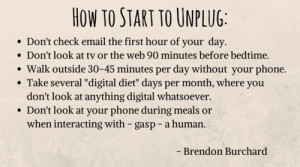
- Disconnect from blue light screens at least one hour before going to sleep. The blue light from the screens in our computers and phones also makes it difficult for our bodies to fall asleep, implying that we should disconnect before bed, rather than falling asleep while staring at our laptops.
- Unplugging May Improve Your Interpersonal Communications. A 2013 study suggests that sharing too much on social media may negatively impact your interpersonal relationships. If you’ve ever accidentally “shared” a post that is offensive to a loved one, or vented about a boss and then been held accountable at work the next day, you likely know all too well that sharing online can have consequences. This study, interestingly, points out that unplugging from technology might benefit in-person communication and interpersonal relationships because it encourages you to communicate outside of the screen- and text-based medium.
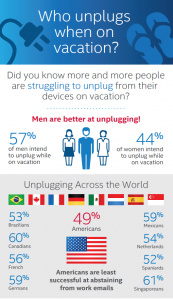
- However you decide to spend your free time, it should be something that doesn’t involve your normal work and allows you to unplug.Find something that you really love to do. If you are not in tune with yourself this may be a little bit difficult. Take a little time to find something you can be passionate about. And, really, if you are not passionate about it — find something, new, fun, cool, weird, outrageous — or whatever. It’s also nice to find someone to do these activities with. Alone is not so fun, cool, weird, or outrageous.
- Carry a book with you. Let’s say you use public transportation for your morning commute or are waiting for an appointment. How do you spend that time? Probably browsing emails, social media, or playing a game, right? Even if it’s not work-related, you’re still relying on technology. Get into the habit of carrying a book with you. This keeps you away from getting sucked into your smartphone or tablet.
- Schedule “free time.” Schedule in some “free time” daily. This is where you’re allowed to play games, watch YouTube, chat to friends, or upload your pics to Instagram. However, once this allotted time is up, switch off your gadgets. This not only keeps you productive, it also helps you get into a pattern of using your tech-time more wisely. This is because if you know that you only have a set amount of time to use technology, you’ll prioritize your tech-related tasks.
The Benefits of Unplugging as a Team
Zarchary First, writing in the Harvard Business Review, recommends you examine having your entire team at work unplug together on a regular basis. He argues, “A growing body of neuroscience research has begun to reveal the exact ways in which information age technologies cut against the natural grain of the human mind. Our understanding of all kinds of information is shaped by our physical interaction with that information. Move from paper to screen, and your brain loses valuable “topographical” markers for memory and insight.”

Although screens have their strengths in presenting information — they are, for example, good at encouraging browsing — they are lousy at helping us absorb, process, and retain information from a focused source. And good old handwriting, though far slower for most of us than typing, better deepens conceptual understanding versus taking notes on a computer — even when the computer user works without any internet or social media distractions First contends. In short, when you want to improve how well you remember, understand, and make sense of crucial information about your organization, sometimes it’s best to put down the tablet and pick up a pencil.
In his five years as senior managing director at the Drucker Institute, where he leads the Un/Workshops consulting practice, he takes executive teams through a fast-paced, transformational experience that requires them to power down their devices and power up their brains. The workshop did not include a single PowerPoint slide or digital simulation.
Instead, he put participants in small groups and equipped them with just some Drucker-based prompts, a box of pens, and a few sheets of paper. People like to say that they “connect” with digital technology but there is no match for the physicality of really energized collaboration — people huddling side-by-side, everyone scribbling notes, all watching their work take shape in real time, without jumping prematurely to the air of finality that comes from a slick digital template.
They accomplished a tremendous amount of design and decision-making in a very short amount of time. Instead of pushing pixels around to make the best show of half-baked ideas, they pushed ideas around to arrive at plans with real promise.
lFirst’s experience is that, when an executive team works “unplugged” for the first time, there is often a moment when the power of briefly setting aside technology shines through. He once asked a global technology firm’s leadership to try a “stone age” solution as they conferred on how to implement a newly hatched strategy. Heretical as it seemed, the meeting did not begin with a full rehash of their 80-slide strategy deck. Instead, we went straight to small groups and a 20-minute assignment: Working on one piece of paper per group, write down the answers to a few basic questions about the heart of the new strategy (on which they had already been briefed many times). The participants experience was enthusiastic and very productive.
Summary:
So there you have it—the good, bad and ugly of social media and smartphone addiction. It should provide you with time to reflect on your habits and see if there’s a need to modify or change them.
Copyright: Neither this article or a portion thereof may be reproduced in any print or media format without the express permission of the author.
Read my latest book: Eye of the Storm: How Mindful Leaders Can Transform Chaotic Workplaces, available in paperback and Kindle on Amazon and Barnes & Noble in the U.S., Canada, Europe and Australia and Asia.
